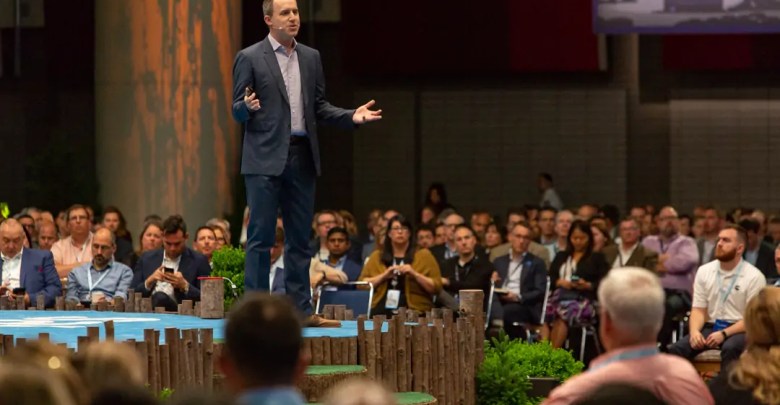Salesforce has announced new innovations across marketing, commerce and service enabling brands worldwide to deliver smarter, more personalized and connected customer experiences. In addition, Salesforce and Google continued to deliver on their strategic partnership with new integrations between Salesforce Marketing Cloud and Google Analytics 360 becoming available. Salesforce is showcasing these innovations and more at Connections, where the world’s top brands are gathered to learn how they can deliver next-generation customer engagement.
The Fourth Industrial Revolution is Creating a Customer Divide
According to the recent Salesforce State of the Connected Customer report, 80 percent of customers say that the experience a company provides is as important as its products or services, and 57 percent have stopped buying from a company because a competitor provided a better experience. Yet companies struggle to keep pace with customers’ expectations for smarter, faster and always-on experiences, which are driven by the role disruptive new technologies play in their daily lives. In the Fourth Industrial Revolution, every interaction on every channel is a “make or break” moment where brands will either strengthen that relationship or further the divide.
The integrations between Marketing Cloud and Analytics 360 empower marketers to deliver meaningful consumer experiences, powered by the world’s #1 marketing platform and Google’s market-leading web analytics solution. Both industry-leading offerings provide valuable insights vital to understanding the consumer. Now, marketers can more efficiently bring those insights together without IT involvement, empowering them to build more effective marketing campaigns around every consumer. Specifically:
Consumer insights from both Marketing Cloud and Analytics 360 can now be combined into a single customer journey analytics dashboard in Marketing Cloud, enabling marketers to analyze cross-channel insights in one place.
With an integration available in beta in Q3 2018, marketers will be able to create audiences — like category buyers, loyalty members and abandoned browsers — in Analytics 360 and then activate those audiences for engagement within Marketing Cloud.
Similarly, Marketing Cloud campaign data is now available within Analytics 360 to deliver tailored web content to individuals based on their interactions with Marketing Cloud campaigns. This also enables marketers to better understand marketing attribution by seeing how their content has influenced transactions.
Salesforce Einstein is artificial intelligence for CRM, built into the Salesforce Platform. Einstein now delivers nearly two billion predictions every day, empowering business users to be more productive, make smarter decisions and deliver more personalized customer experiences. With Marketing Cloud Einstein, marketers can predict the optimal timing, channel, content and audience for any marketing message. The latest Marketing Cloud Einstein innovations include:
Einstein Segmentation: Leveraging machine learning and pattern analysis, Einstein Segmentation, part of the Salesforce data management platform (DMP), analyzes billions of consumer signals, uncovers patterns in consumer behaviour and discovers new audiences to reach with personalized messages. Now, marketers will be able to use AI to build the most relevant audience for every campaign.
Einstein Splits: Einstein Splits enables marketers to create unique, personalized journey paths for each customer. Now, marketers can save time with pre-configured decision splits based on Einstein engagement likelihood scores. They can also drag-and-drop Einstein Split decision flows in Marketing Cloud Journey Builder to test different journey paths and message tactics based on a customer’s likelihood to open, click or unsubscribe from an email; convert on a brand’s website; or their engagement personas, such as a loyalist or dormant customer.
New marketing, commerce and service innovations across the Salesforce Customer Success Platform empower companies to personalize experiences that put the customer at the center of their business. These include:
Commerce Cloud B2B Commerce: B2B Commerce delivers consumer-like shopping experiences to business buyers, but with the B2B-specific functionality they need, such as custom catalogs, authenticated logins, one-click reordering for large orders, multiple shipping locations and payment types, and the ability to place orders with hundreds or thousands of SKUs.
Marketing Cloud Interaction Studio: Interaction Studio enables companies to visualize, analyze and deliver contextually relevant experiences to consumers, including offers, promotions, discounts and more across a brand’s owned online and offline channels, including email, social, mobile and in-store. With real-time interaction management, Interaction Studio suggests the next best offer for consumers based on how they are interacting with the brand.
Service Cloud LiveMessage: LiveMessage is expanding SMS support globally to 17 additional countries in APAC, EMEA and Latin America, including Singapore, France and Brazil. LiveMessage enables companies to communicate with customers through two-way mobile messaging. Customers can message a brand to ask a question, initiate a return or schedule a delivery time. With the newly expanded global availability for SMS, customer service teams can message with customers located in other countries around the world, regardless of carrier or device manufacturer, using a local number.
Seventy percent of consumers say connected processes—such as seamless handoffs between departments and channels, or contextualized engagement based on earlier interactions—are very important to win their business. Sales, service, marketing and commerce teams that have traditionally concerned themselves only with one part of the customer journey must now consider every customer touchpoint. At Connections, Salesforce is introducing new ways to integrate Salesforce Clouds to deliver the seamless cross-channel experiences that consumers want:
Service for Commerce: New levels of integration between Service Cloud and Commerce Cloud will increase customer satisfaction and enable customer service to become more agile. For example, service agents can access real-time commerce data within a single Service Cloud console, including up-to-date shopper data and order-on-behalf-of capabilities that unlock selling opportunities.
Commerce Journeys: By bringing together Marketing Cloud and Commerce Cloud, marketers and merchandisers will be able to trigger transactional and behavioural journeys based on customer actions, such as abandoning a shopping cart, confirming an account or making a purchase.
Thousands of marketing, commerce and customer service leaders from top brands are coming together in Chicago, Illinois this week to blaze their trail to better, smarter customer engagement. Speakers include leaders from companies like Ancestry, Lilly, T-Mobile and Ticketmaster, as well as Salesforce partners including Accenture Interactive, Deloitte Digital, Dentsu, IPG-MRM, Publicis and WPP-Wunderman.
TagsSalesforce Edit Post


